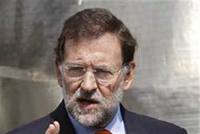 Spaniards are expected to throw out the Socialists they blame for a disastrous economic situation in an election on Sunday and to vote in a centre-right party likely to dole out more bitter medicine in the form of public spending cuts.
Spaniards are expected to throw out the Socialists they blame for a disastrous economic situation in an election on Sunday and to vote in a centre-right party likely to dole out more bitter medicine in the form of public spending cuts.
Opinion polls show the People’s Party (PP), led by Mariano Rajoy, has an unassailable lead over the ruling Socialists, who have led the country from boom to bust in seven years in power.
Voters are angry with the Socialists for failing to act swiftly to prevent the economic slide and then for bringing in austerity measures that have cut wages, benefits and jobs.
Yet people are now resigned to further slashes in spending on health and education in the midst of a European debt crisis that has toppled the governments of Ireland, Portugal, Greece and Italy and pushed Spain’s borrowing costs ever higher.
“I’m going to vote for the PP, just for a change. We need to bring in people to straighten this out. It’s outrageous to have 5 million people unemployed. They have to do something, I don’t know what,” said 35-year-old Angel, queuing at a benefits office in Madrid after losing his job as a bus driver.
Spain’s grim economic outlook dominated the election campaign. The country is home to nearly one third of the euro zone’s unemployed, with one in five Spanish workers without a job, and its economy is threatening to slip into recession next year for the second time in three years.
Rajoy, who led his party in two previous failed parliamentary election campaigns, is likely to win an absolute majority giving him a clear mandate to enforce the deep cuts seen as necessary to balance Spain’s books.
The 56-year-old will not be sworn in until December. But he will be eager to lay out plans during the handover period to reassure fraught markets that have lost faith in the euro zone project.
Spain’s borrowing costs touched euro-era highs in the week running up to the election and came perilously close to the 7 percent level at which other euro zone nations like Ireland and Greece sought international bail-outs.
FAREWELL TO SOCIALISTS
Voting stations close at 8 p.m. (1900 GMT) on Sunday and complete election results are expected a few hours later.
Prime Minister Jose Luis Rodriguez Zapatero decided against running for a third term as his approval ratings sank during the worst economic slowdown in modern times.
The Socialists chose veteran politician Alfredo Perez Rubalcaba as their leader for the campaign, but he has struggled to differentiate himself from Zapatero, since he served in his cabinet for years, most recently as his deputy.
On the eve of the election, around 200 demonstrators from the “Indignados” movement gathered in the Puerta del Sol square in Madrid to protest against the main political parties, a fraction of the thousands that flocked there earlier this year.
“The situation in Spain is very bad and we have to protest,” said demonstrator Luis Garcia, who cannot get a steady job and lives from giving occasional private language lessons. “The two main parties are the serfs of the bankers.”
The movement, largely composed of young people, began in May when Spaniards took to the streets to decry government policies they said offered them no future. More than 45 percent of Spaniards under 25 are out of work, the worst rate in Europe.
The protests, which inspired Occupy Wall Street and other movements across the globe, have petered out in recent weeks but could start up again once Rajoy’s spending cuts bite.
Spain joined the euro in 1999 and enjoyed years of prosperity and a real estate boom driven by cheap credit. When the property market crashed in 2007 the government, companies and consumers all found themselves over their heads in debt.
The austerity measures, along with bail-outs and forced recapitalisation of banks, have succeeded so far in keeping the country from an international rescue.

Leave a Reply
You must be logged in to post a comment.